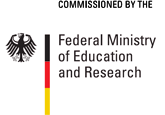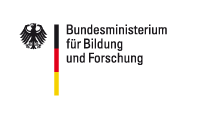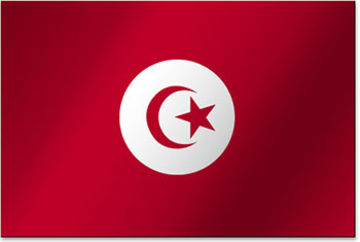11. 08. 2015
1 Funding purpose and legal basis
1.1 Funding purpose
This joint German-Tunisian announcement aims at intensifying the cooperation between Tunisia and Germany in the field of science and technology.
1.2 Legal basis
On the German side:
The Federal Government will award grants in accordance with these funding regulations, sections 23 and 44 of the Federal Budget Code (BHO) and the administrative regulations adopted there under as well as the BMBF's regulations governing applications for expenditure-based grants (AZA) and/or cost-based grants (AZK). There is no legal entitlement to a grant. The funding authority will take a decision after due assessment of the circumstances and within the framework of the budget funds available.
The awarding of grants to companies is governed by the provisions of Commission Regulation (EU) No 1407/2013 of 18 December 2013 on the application of Articles 107 and 108 of the Treaty on the Functioning of the European Union to de minimis aid (Official Journal of the EU L 352 p.1 et seqq of 24 December 2013) as amended. De minimis aid must not exceed €200,000 (or €100,000 in road freight transport) over any period of three fiscal years. The notification of award will include a de minimis statement. This statement must be:
- kept for ten years;
- Produced at the request of the European Commission, a federal or Land authority or the funding authority within one week or a longer period specified in the request. Should the statement not be produced within this period, the Federal Ministry of Education and Research reserves the right to revoke the award and reclaim the funds awarded;
- Submitted with any future application for de minimis aid as evidence of de minimis aid already granted.
On the Tunisian Side:
This joint announcement is based on the joint Memorandum of Understanding (MoU) on cooperation in the field of science and technology between Tunisia and Germany of 10. September 1998.
2 Object of funding
The funding relates to initiating, intensifying and networking R&D collaborations between German and Tunisian research institutions and universities with the following purposes:
- To develop joint project ideas in subject areas that are key to research policy in the BMBF’s specialist programmes and European research programmes, and to undertake preliminary scientific work in relation to this for a successful application (feasibility studies/pilot measures),
- To explore the potential of both partner countries in science, research and technological development and for the application of research findings,
- To present the strengths of German and Tunisian institutions as international partners in science, research and innovation,
- To establish new contact with service providers in the partner countries and enable access to internationally unique research locations and infrastructures,
- To support ongoing R&D activities by fostering networks amongst the next generation of scientists (PhD students) in both countries,
- To produce scenarios for strategic international partnerships between German and Tunisian universities and research institutions.
This joint announcement is open to researchers from all disciplines.
Particular importance will be attached to the participation of commercial companies, especially small and medium-sized enterprises (SMEs*).
3 Funding recipients
On the German side:
German universities, non-university research institutions and other institutions contributing to research as well as commercial companies headquartered in Germany – particularly small and medium-sized enterprises (SMEs) – which fulfil the funding purpose and requirements are eligible for funding.
Research institutions which receive joint basic funding from the Federal Government and the Länder can only be granted project funding supplementary to their basic funding to cover additional project-related expenditure and/or costs under certain preconditions.
On the Tunisian side:
Tunisian research institutes or centres and universities are eligible for funding (with the possibility of the socialization of SMEs).
4 Funding prerequisites
Only bilateral projects are eligible for funding. Any application for funding must be submitted jointly by a German applicant and a cooperation partner from Tunisia. Further partners from Germany and Tunisia may participate in the research project if this benefits the project and further partners contribute their own funds.
Securing institutional or other third-party funding for project activities at home and abroad is a basic prerequisite.
Projects proposed for funding under this call should document their potential for longer-term sustainable cooperation between Germany and Tunisia.
5 Type, scope and amount of funding
On the German side
The budget to be applied for on the German side should not exceed €25,000 per project. The maximum duration of a project should not exceed 24 months.
Funds can be granted through project funding as non-repayable subsidies.
Applicants are advised to familiarise themselves – in their own interests – with the EU’s Research Framework Programme in the context of the planned national project. They should examine whether the planned project includes specific European components which make it eligible for exclusive EU funding. Furthermore, they should examine whether an additional application for funding can be submitted to the EU in the context of the planned national project. The outcome of this check should be described briefly in the national application.
Grants for industrial companies are calculated on the basis of the eligible project-related costs, which are generally financed up to 50% depending on how practically oriented the project is. The BMBF’s policy requires that these companies contribute at least 50% towards the eligible costs incurred.
Grants for universities, research and science institutions and similar establishments are calculated on the basis of the eligible project-related expenditure (grants for Helmholtz centres and the Fraunhofer Gesellschaft (FhG) are calculated on the basis of the eligible project-related costs) that can be individually funded up to 100%.
The European Commission's Community Framework for State Aid for Research and Development must be taken into account when calculating the respective funding ratio. This Community Framework allows a differentiated bonus arrangement for collaborative projects involving applicants in the new German Länder and for small and medium-sized enterprises (SMEs), which may result in a higher rate of funding.
The following expenditures are eligible for funding on the German side:
a) Exchange of experts and young scientists:
The following applies to the funding of travel expenses for German project scientists:
- Travel expenses (air tickets: Economy Class) to and from the location of the project partner will be covered by the sending country, whereas daily allowances will be paid by the host country.
- The foreign project partner is principally responsible for the granting of daily allowances for German experts abroad.
The following applies to the funding of travel expenses of foreign project scientists to Germany:
- Daily allowances and project-related domestic travel expenses: as a rule, a fixed lump-sum of €104 per day and/or €2,300 per month (for stays from 23 up to 31 days) will be paid annually for stays of up to 3 months in Germany by the funding authority.
- For single days of a following month, a daily allowance of €77 per day will be paid. The days of arrival and departure together are counted as one day only.
- These lump-sums also cover contributions to health insurance and, if applicable, other types of insurance, which must therefore be paid by the recipients themselves.
- Travel expenses to and from the location of the project partner will be covered by the sending country.
b) Workshops
Workshops with already known partners or workshops aimed at opening up new cooperation potential can be supported in the following ways:
Grants will be provided towards material expenses incurred in the organisation of bilateral workshops in Germany, including the accommodation of foreign guests, transfer within Germany, the preparation of the workshop, entertainment and the rental of the venue. The amount of the grant depends on the size of the workshop and the number of foreign guests. No daily allowances (cf. a) will be paid in such cases.
c) Equipment:
- Project-related subsidies will be granted for equipment (expendable items, devices, business needs, transportation expenses, literature, rents, orders, etc.) in duly justified exceptional cases and on a limited scale.
In principle, costs for basic equipment are neither covered nor eligible for funding; this includes:
- expenditure on e.g. office stationery or communication
- Laboratory and computer equipment.
On the Tunisian side:
The budget allocated for each project is €13,000 per year for a total budget of €26,000 on the two years.
Funds can be granted through project funding as non-repayable subsidies
The following expenditures are eligible for funding on the Tunisian side:
a) Exchanges of experts and young scientists:
- Financial support for the approved projects is usually provided for exchange visits by project team members. In exchanges of project researchers and student researchers, the sending party covers the costs of international travel and the receiving party meets the boarding and lodging expenses.
- The financial coverage of the expenses of the visiting project researchers by the receiving party will consist of the following:
- Accommodation and food or a daily allowance of €60 for researchers
- €280 per month will be paid for student researchers.
b) Workshops
Workshops, seminars, exhibitions, etc. with already known partners or workshops aimed at opening up new cooperation potential can be supported in the following ways:
- Grants will be provided towards material expenses incurred in the organisation of bilateral workshops in Tunisia, including the accommodation of foreign guests, transfer within Tunisia, the preparation of the workshop, entertainment and the rental of the venue. The amount of the grant depends on the size of the workshop and the number of foreign guests. No daily allowances will be paid in such cases.
6 Other terms and conditions for awarding grants
The General Auxiliary Conditions for Grants Provided for Projects on an Expenditure Basis (ANBest-P) and the Special Auxiliary Terms and Conditions for Funds provided by the BMBF for the Promotion of Projects on Expenditure Basis (BNBest-BMBF98) will form part of the notification of award of grants on an expenditure basis. The Auxiliary Terms and Conditions for Funds provided by the BMBF on a Cost Basis (NKBF98) will be part of the notification of award for grants on a cost basis.
7 Procedure
7.1 Implementation
On the German side:
The Federal Ministry of Education and Research (BMBF) has commissioned the following project management agency with implementing the funding measure:
DLR Project Management Agency (DLR-PT)
European and International Cooperation
Heinrich-Konen-Straße 1
53227 Bonn
Internet: http://www.internationales-buero.de/
Scientific officer:
Mr. Stephan Epe
E-mail: Stephan.Epe@dlr.de
Phone: +49(0)228-3821-1904
Fax: +49(0)228-3821-1490
Administrative contact persons:
Ms. Silva Luthin-Geier
E-Mail: Silva.Luthin-Geier@dlr.de
Phone: +49 228/38 21-1863
Fax: +49 228/38 21-1490
Mr. Valéry Anton
E-Mail: Valery.Anton@dlr.de
Phone: +49 228/38 21-1848
Fax: +49 228/38 21-1400
On the Tunisian side:
Ministry of Higher Education and Scientific Research (General Directorate of Scientific Research)
Ms. Awatef Soltane / Mr. Mhamed BEN ABID
Address: Avenue Ouled Haffouz – 1030 Tunis, Tunisia.
Tel : +216 71 835 351
Fax: +216 71 835 351
Email: tunisian.german.coop.2015@gmail.com
7.2 Submission of formal funding applications and decision-making procedure
The funding procedure consists of two stages.
7.2.1 Submission and selection of project descriptions
The researchers of both countries are to form a research team in a selected research field. To initiate a project, scientists from both countries will form a joint research team and prepare a research proposal in English. Each team will be led by one Tunisian principal investigator and one German principal investigator.
In the first stage, a draft proposal is to be submitted in English by 28 September 2015 at the latest, using the electronic system PT-Outline (https://www.pt-it.de/ptoutline/application/TUNGER2015).
Applications received after the deadline may not be considered as eligible.
The draft proposal consists of two parts:
- Part A. Information for administrative purposes in PT-Outline
- Part B. An individual, call-specific project description in English, with the following structure:
- I. Objectives, excellence and originality of the proposal
- II. Status of science and technology; previous work/research
- III. Comprehensive description of methodology and work plan
- IV. Benefits and utilisation of results
- V. Cooperation with other partners
- VI. Need for project support
- VII. Financial sheet
- VIII. Annexes
A German summary must be included (one page max.).
This project description (Part B) has to be uploaded as a single document in PT-Outline (zip-archive or pdf-document).
The draft proposal is the basis for the scientific and content-specific evaluation of the project. The project description should therefore contain comprehensive evidence regarding all positions of the outline (see structure for project description above).
The description should not exceed 10 pages (Arial Font Size 11, 1.5 line spacing, and 2 cm margin, without list of publications and other annexes, excluding German summary).
The print version of the proposal is to be sent respectively to the DLR Project Management Agency (see sec. 7.1) and General Directorate of scientific research (on Tunisian side) as soon as possible. Please indicate the project ID number, which is issued after the completion of the submission of the project proposal via PT-Outline, on all documents.
On the Tunisian side, the print version of proposals must be:
- Approved by the heads of the institutions of the coordinators,
- Submitted by Tunisian Principal Investigators to MHESR (1 hard copy + 1 digital copy); electronic submission by the same deadline is also compulsory.
Only jointly submitted proposals will be considered. Proposals submitted by one side only cannot be considered.
The evaluation of the project proposals received will be executed on the German as well as on the Tunisian side according to the following criteria.
- Compliance of the project with the objective of the announcement (see sec. 2 of this announcement)
- Quality and originality of the proposal
- Qualification of the applicants
- Added value of the cooperation
- Appropriateness and necessity of funding applied for
Funding decisions will be made after a final review of the applications based on the evaluation criteria mentioned above. Only applications that are approved by both sides will receive funding. Applicants will be informed in writing about the result of the selection process.
7.2.2 Submission of formal funding applications
On the German side:
In the second stage, applicants whose draft proposals have been evaluated positively will be invited to submit – in coordination with the designated project coordinator – a formal application for funding on which a decision will be taken after a final evaluation.
Applicants must use the BMBF’s electronic application system “easy-online” to draft formal applications for funding. The link will be provided only in case of positive evaluation.
On the Tunisian side:
In the second stage, projects which are to be jointly selected will be the subject of a research agreement between the Minister of Higher Education and Scientific Research and the project coordinator. This agreement contains several articles relating to budget, project duration, and submission of a mid-term report prior to the end of the annual period in project execution and final reports within one month/two months of the effective end of the whole project. The agreement is attached to the table of the distribution of funds, which includes a breakdown of the budget allocated for the project.
8 Entry into force
In Germany, this announcement will enter into force on the date of publication in the Federal Gazette (Bundesanzeiger).
Bonn, 11.08.2015
|
Federal Ministry of Education and
|
Tunisian Ministry of Higher Education and Scientific Research (General Directorate of Scientific Research) |
| P e t e r W e b e r s Head of Division Cooperation with Developing and Emerging Countries, Africa and the Middle East |
Mohamed Nejib Lazhari
|
* In accordance with the EU’s definition of SMEs: The category of micro, small and medium-sized enterprises (SMEs) is made up of enterprises which employ fewer than 250 employees and which have an annual turnover not exceeding € 50 million, and/or an annual balance sheet total not exceeding € 43 million. Within this category the following definitions apply: small enterprises are defined as enterprises which employ fewer than 50 persons and whose annual turnover and/or annual balance sheet total does not exceed € 10 million. A micro-enterprise is defined as an enterprise which employs fewer than 10 persons and whose annual turnover and/or annual balance sheet total does not exceed € 2 million. In general, most SMEs are autonomous sine they are either completely independent or have one or more minority partnerships (each less than 25 %) with other enterprises, which have one or more minority stakes (see 2.3.1, p. 16). If that holding rises to no more than 50%, the relationship is deemed to be between partner enterprises (see 2.3.2, p.20). Above that ceiling, the enterprises are linked (see 2.3.3, p.23).
Source: http://ec.europa.eu/enterprise/enterprise_policy/sme_definition/sme_user_guide_de.pdf and http://ec.europa.eu/enterprise/policies/sme/facts-figures-analysis/sme-definition/index_en.htm










